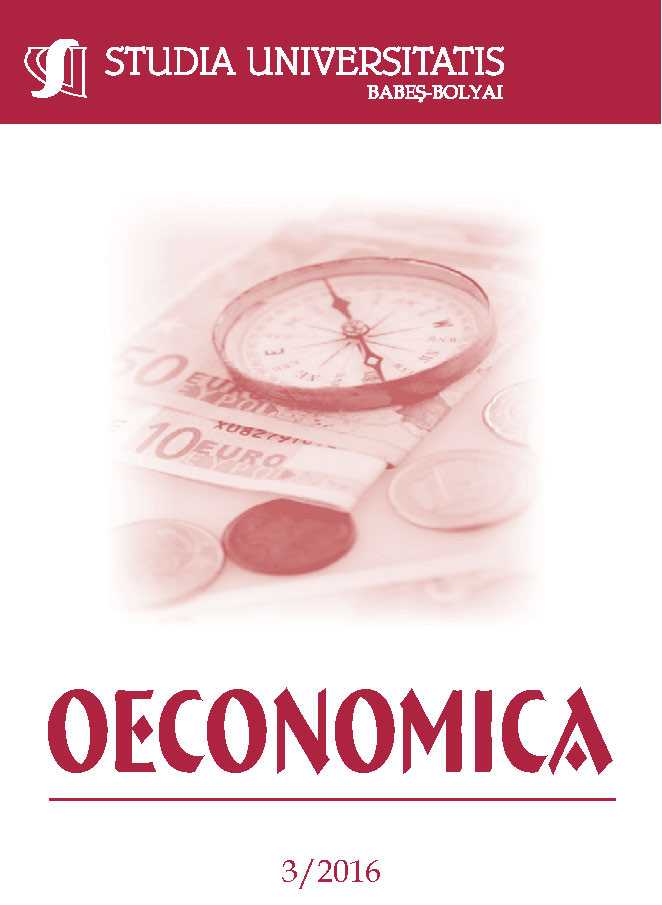TEACHERS’ MOTIVATIONS AND EXPECTATIONS REGARDING LIFELONG LEARNING
Keywords:
education, lifelong learning, information sharing, technological change, new teaching techniquesAbstract
https://doi.org/10.1515/subboec-2016-0003
The global contemporary economic and social context, in constant change, makes the learning process undergo constant structural changes with profound implications. These transformations also influence practices, principles and methods used in the field of learning and teaching. The present research is focused on the motivations and expectations of teachers regarding lifelong learning. Their main motivator is to improve teaching tools, techniques and methods. The study population consists of educators who teach Romanian language and literature to national minorities (Hungarian, German, Roma, Tatar, Serbian, Ukrainian, etc.) and to migrants from various states. The respondents have participated in a lifelong learning program.
JEL Classification: I26, I29, M31, M53
References
Băcilă, M., Pop, C.M., Scridon, M.A. & Ciornea, R. (2014) Development of an Instrument for Measuring Student Satisfaction in Business Educational Institutions, Amfiteatru Economic, 16(37), pp. 841-856.
Belás, J., Ključnikov, A., Vojtovič, S., Sobeková-Májková, M. (2015) Approach of the SME Entrepreneurs to Financial Risk Management in Relation to Gender and Level of Education, Economics and Sociology, 8(4), pp. 32-42.
Blanden, J., Buscha, F., Sturgis, P. & Urwin, P. (2012) Measuring the Earnings Returns to Lifelong Learning in the UK, Economics of Education Review, 31, pp. 501-514.
Bodea, C.N., Mogoș, R.I., Dascălu, M.I., Purnuș, A. & Ciobotar, N.G. (2015) Simulation-Based E-Learning Framework for Entrepreneurial Education and Training, Amfiteatru Economic, 17 (38), pp. 10-24.
Bolhuis, S., 2003, Towards Process-Oriented Teaching for Self-Directed Lifelong Learning: A Multidimensional Perspective, Learning and Instructions, 13 (3), pp. 327-247.
Collinson, Vivienne, Cook, Tanya Fedoruk (2004), Learning to share, sharing to learn. Fostering organizational learning through teachers’ dissemination of knowledge, Journal of Educational Administration, 42(3), pp. 312 – 332.
Dabija, D.C. & Pop, C.M. (2015) Final Research report (Raport final de cercetare) for the Program “Perfecționarea cadrelor didactice din învățământul preuniversitar care predau limba română minorităților naționale”, POSDRU/87/1.3/S/63909.
Dabija, D.C., Dinu, V., Postelnicu, C-, Mihăilă, A. (2017) Stakeholders’ Perception of Sustainability Orientation within a Major Romanian University, International Journal of Sustainability in Higher Education, Emerald, 18 (5).
Dabija, D.C., Postelnicu, C. & Pop, N.A. (2014) Methodology for Assessing the Degree of Internationalization of Business Academic Study Programs, Amfiteatru Economic, 16 (37), pp. 726-745.
Demirel, M. (2009) Lifelong Learning and Schools in the Twenty-First Century, Procedia - Social and Behavioural Sciences, 1, pp. 1709-1716.
Dinu, V. (2010) Commercial Activity and the Sustainable Development, Amfiteatru Economic, 12 (27), pp. 5-8.
Duke, C. & Hinzen, H. (2014) University engagement and the post-2015 agenda. What are the roles and functions to support adult education and lifelong learning?, Procedia - Social and Behavioral Sciences, 142, pp. 29-35.
European Commission (2014) Strategic Framework – Education & Training 2020. Available online at http://ec.europa.eu/education/policy/strategic-framework/index_en.htm, accessed on June 10, 2015.
Finsterwald, M., Wagner, P., Schober, B., Luftenegger, M. & Spiel, C. (2013) Fostering Lifelong Learning – Evaluation of a Teacher Education Program for Professional Teachers, Teaching and Teacher Education, 29, pp. 144-155.
Galvez, I.E., Cruz, F.J.F., Díaz, M.J.F. (2016) Evaluation of the impact of quality management systems on school climate, International Journal of Educational Management, Vol. 30(4), pp. 474-492.
Helterbran, V.R. (2005) Lifelong or School-long Learning. A Daily Choice, The Clearing House, 78 (6), pp. 261-263.
Kinash, S., Naidu, V., Knight, D., Judd, M.M., Nair, C.S., Booth, S., Fleming, J., Santhanam, E., Tucker, B., Tulloch, M. (2015) Student feedback: a learning and teaching performance indicator, Quality Assurance in Education, 23(4), pp. 410 – 428.
Klug, J., Krause, N., Schober, B., Finsterwald, M. & Spiel, C. (2014) How do Teachers Promote their Students’ Lifelong Learning in Class? Development and First Application of the LLL Interview, Teaching and Teacher Education, 37, pp. 119-129.
Laal, M. & Salamati, P. (2012) Lifelong Learning; Why do we Need It?, Procedia - Social and Behavioral Sciences, 31, pp. 399-403.
Laal, M. (2011) Barriers to Lifelong Learning. Procedia – Social and Behavioral Sciences, 28, pp. 612-615.
O'Leary, S. (2015), The Role of Enterprise and Entrepreneurship within Higher Education and Effective Economic Governance Across Central and Eastern Europe, Economics and Sociology, 8(2), pp. 143-153.
Pelău, C., Bena, I., Vlădoi, A.D., Dabija, D.C., Fufezan, M., (2011) The Quality of Knowledge Flows and its Impact on the Intellectual Capital Development of a University, In: Turner, G., Minnone, C., (Eds.) Proceedings of the 3rd European Conference on Intellectual Capital, ECIC 2011, 18-19 April, Nicosia, Cyprus, pp. 322-327.
Pocatilu, C. & Ciurea, C. (2011) Modern Solutions for Economic Higher Education in the Knowledge Based-Society, Amfiteatru Economic, 13(30), pp. 497-511.
Postelnicu, C. & Dabija, D.C. (2015). Transfer and Diffusion of New Technologies within the Supply Chain of multinational companies with operations in to Developing Economies – A Contemporary Approach. In Văduva, S., Andrew, R.T. (Ed.). Geopolitics, Development, and National Security - Romania and Moldova at the Crossroads. Springer Publishing House, USA, pp. 53-66.
Rodrigues, Maria João, (2006) The Lisbon Strategy after the mid-term review: implications for innovation and life-long learning, Corporate Governance: The international journal of business in society, 6(4) pp. 349 – 357.
Sălcudean, I.N., Vereş, V.A., Pop, C.M. (2014) The Social and Cultural Dimension of Lifelong Learning in the European Union. Study Case: Babeş-Bolyai University, Procedia – Social and Behavioral Sciences, 142, pp. 162-168.
Tate, P., Klein-Collins, R. & Steinberg, K. (2011) Lifelong Learning in the USA: A Focus on Innovation and Efficiency for the 21st Century Learner, International Journal of Continuing Education and Lifelong Learning, 4(1), pp. 1-23.
UNESCO Institute for Lifelong Learning (2014) Lifelong Learning Policies and Strategies. Online available at http://uil.unesco.org/home/programme-areas/lifelong-learning-policies-and-strategies/news-target/lifelong-learning/9bf043146eaa0985e05daa9e12135f5b, accessed on June 20, 2015.
Downloads
Published
How to Cite
Issue
Section
License
Copyright (c) 2016 Studia Universitatis Babeș-Bolyai Oeconomica

This work is licensed under a Creative Commons Attribution-NonCommercial-NoDerivatives 4.0 International License.






